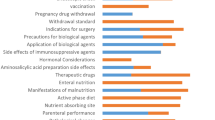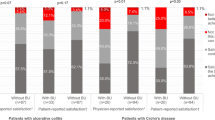Abstract
Inflammatory bowel disease is rare in the Chinese population, which may result in limited support, misinformation, and unalleviated fears and adversely affect quality of life (QOL). This study compared the inflammatory bowel disease (IBD)-related knowledge, QOL, and use of complementary and alternative medicines and therapies (CAMT) in two contrasting IBD populations. Chinese and Caucasian IBD patients completed a questionnaire on IBD knowledge and CAMT usage. QOL was evaluated using the validated Inflammatory Bowel Disease Questionnaire. One hundred sixty-two IBD patients were recruited, 81 Chinese and 81 Caucasian. The IBD knowledge score was higher in Caucasian than in Chinese IBD patients (median difference, 6.5; P = 0.001) and was independent of education and occupation. Twenty-one-percent of Chinese subjects incorrectly identified their IBD type (0% in the Caucasian group; P < 0.001). QOL was higher in the Chinese than the Caucasian group, but not significantly different after adjusting for disease activity. QOL was unassociated with IBD knowledge. The overall use of CAMT was similar in both groups (33% of Chinese and 37% of Caucasian patients) and similar for Crohn's disease and ulcerative colitis. IBD-related knowledge was inferior in Chinese compared to Caucasian IBD patients. Health-related QOL is unlikely to be greatly influenced by disease-related knowledge or education. A high proportion of Chinese and Caucasian IBD patients uses CAMT.
Similar content being viewed by others
REFERENCES
Kennedy AP, Rogers AE: Improving patient involvement in chronic disease management: the views of patients, GPs and specialists on a guidebook for ulcerative colitis. Patient Educ Couns 47:257-263, 2002
Martin A, Leone L, Castagliulol I, et al.: What do patients want to about inflammatory bowel disease? Ital J Gastroenterol 24:477-480, 1992
Smart H, Mayberry J, Calcraft B, et al.: Effect of information booklets on patients' anxiety levels and consultation rates in Crohn's disease. Public Health 100:184-186, 1986
Verma S, Tsai HH, Giaffer MH: Does better disease-related education improve quality of life? Dig Dis Sci 46:865-869, 2001
Borgaonkar MR, Townson G, Donnelly M, et al.: Providing disease-related information worsens health-related quality of life in inflam-matory bowel disease. Inflam Bowel Dis 8:264-269, 2002
Loftus EV Jr, Sandborn WJ: Epidemiology of inflammatory bowel disease. Gastroenterol Clin N Am 31:1-20, 2002
Yang SK, Loftus EV Jr, Sandborn WJ: Epidemiology of inflammatory bowel disease in Asia. Inflam Bowel Dis 7:260-270, 2001
Lennard-Jones JE: Classification of inflammatory bowel disease. Scand J Gastroenterol Suppl 24:2-6, 1989
Irvine EJ, Feagan B, Rochon J, et al.: Quality of life: A valid and reliable measure of therapeutic efficacy in the treatment of inflammatory bowel disease. Gastroenterolgy 106:287-296, 1994
Leong RWL, Lee YT, Ching JYL, et al.: Quality of life in Chinese patients with inflammatory bowel disease: validation of the Chinese translation of the inflammatory bowel disease questionnaire. Aliment Pharmacol Ther 17:711-718, 2003
Best WR, Becktel JM, Singleton JW: Rederived values of the eight coefficients of the Crohn's Disease Activity Index (CDAI). Gastroenterology 77:843-846, 1979
Lichtiger S, Present DH, Kornbluth A, et al.: Cyclosporine in severe ulcerative colitis refractory to steroid therapy. N Engl J Med 330:1841-1845, 1994
Eaden JA, Abrams K, Mayberry JF: The Crohn's and colitis knowledge score: A test for measuring patient knowledge in inflammatory bowel disease. Am J Gastroenterol 94:3560-3566, 1999
Scholmerich J, Sedlak P, Hoppe-Seyler P, Gerok W: The information needs and fears of patients with inflammatory bowel disease. Hepatogastroenterology 34:182-185, 1987
Author information
Authors and Affiliations
Rights and permissions
About this article
Cite this article
Leong, R.W.L., Lawrance, I.C., Ching, J.Y.L. et al. Knowledge, Quality of Life, and Use of Complementary and Alternative Medicine and Therapies in Inflammatory Bowel Disease: A Comparison of Chinese and Caucasian Patients. Dig Dis Sci 49, 1672–1676 (2004). https://doi.org/10.1023/B:DDAS.0000043384.26092.f4
Issue Date:
DOI: https://doi.org/10.1023/B:DDAS.0000043384.26092.f4




